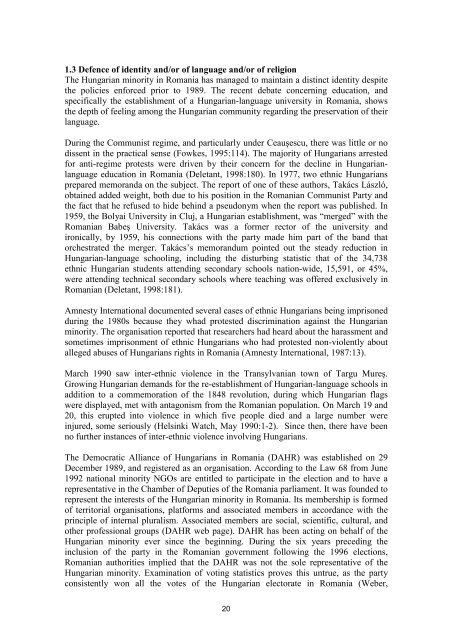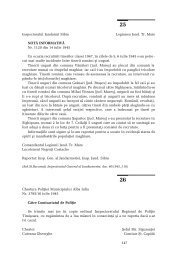Southeast Europe
Southeast Europe
Southeast Europe
You also want an ePaper? Increase the reach of your titles
YUMPU automatically turns print PDFs into web optimized ePapers that Google loves.
1.3 Defence of identity and/or of language and/or of religion<br />
The Hungarian minority in Romania has managed to maintain a distinct identity despite<br />
the policies enforced prior to 1989. The recent debate concerning education, and<br />
specifically the establishment of a Hungarian-language university in Romania, shows<br />
the depth of feeling among the Hungarian community regarding the preservation of their<br />
language.<br />
During the Communist regime, and particularly under Ceauşescu, there was little or no<br />
dissent in the practical sense (Fowkes, 1995:114). The majority of Hungarians arrested<br />
for anti-regime protests were driven by their concern for the decline in Hungarianlanguage<br />
education in Romania (Deletant, 1998:180). In 1977, two ethnic Hungarians<br />
prepared memoranda on the subject. The report of one of these authors, Takács László,<br />
obtained added weight, both due to his position in the Romanian Communist Party and<br />
the fact that he refused to hide behind a pseudonym when the report was published. In<br />
1959, the Bolyai University in Cluj, a Hungarian establishment, was “merged” with the<br />
Romanian Babeş University. Takács was a former rector of the university and<br />
ironically, by 1959, his connections with the party made him part of the band that<br />
orchestrated the merger. Takács’s memorandum pointed out the steady reduction in<br />
Hungarian-language schooling, including the disturbing statistic that of the 34,738<br />
ethnic Hungarian students attending secondary schools nation-wide, 15,591, or 45%,<br />
were attending technical secondary schools where teaching was offered exclusively in<br />
Romanian (Deletant, 1998:181).<br />
Amnesty International documented several cases of ethnic Hungarians being imprisoned<br />
during the 1980s because they whad protested discrimination against the Hungarian<br />
minority. The organisation reported that researchers had heard about the harassment and<br />
sometimes imprisonment of ethnic Hungarians who had protested non-violently about<br />
alleged abuses of Hungarians rights in Romania (Amnesty International, 1987:13).<br />
March 1990 saw inter-ethnic violence in the Transylvanian town of Targu Mureş.<br />
Growing Hungarian demands for the re-establishment of Hungarian-language schools in<br />
addition to a commemoration of the 1848 revolution, during which Hungarian flags<br />
were displayed, met with antagonism from the Romanian population. On March 19 and<br />
20, this erupted into violence in which five people died and a large number were<br />
injured, some seriously (Helsinki Watch, May 1990:1-2). Since then, there have been<br />
no further instances of inter-ethnic violence involving Hungarians.<br />
The Democratic Alliance of Hungarians in Romania (DAHR) was established on 29<br />
December 1989, and registered as an organisation. According to the Law 68 from June<br />
1992 national minority NGOs are entitled to participate in the election and to have a<br />
representative in the Chamber of Deputies of the Romania parliament. It was founded to<br />
represent the interests of the Hungarian minority in Romania. Its membership is formed<br />
of territorial organisations, platforms and associated members in accordance with the<br />
principle of internal pluralism. Associated members are social, scientific, cultural, and<br />
other professional groups (DAHR web page). DAHR has been acting on behalf of the<br />
Hungarian minority ever since the beginning. During the six years preceding the<br />
inclusion of the party in the Romanian government following the 1996 elections,<br />
Romanian authorities implied that the DAHR was not the sole representative of the<br />
Hungarian minority. Examination of voting statistics proves this untrue, as the party<br />
consistently won all the votes of the Hungarian electorate in Romania (Weber,<br />
20









